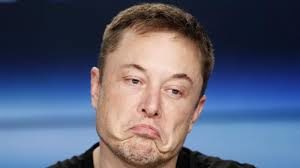Does SpaceX sound familiar? The company that manufactures rockets that after launching their satellites come back to Earth to safely resume their position on land awaiting a new takeoff? Or Tesla? The firm producing one of the most popular (and expensive!) electric cars? Or PayPal? The online payment company acquired by Ebay for $1.5 billion? They all share the same “father”. A guru of entrepreneurship and innovation, called Elon Musk, who with a net worth of over $20 Bn. is the 52nd richest man on Earth.
 However, investors punish arrogance, self-sufficiency and lack of predictability irrespective of the name featuring all three. The latest Elon Musk`s communication to investors (earnings call) was dubbed by many analysts and journalists as bizarre, and by others disappointing. Departing from his traditional way of addressing investors, Musk treated some of the attending analysts condescendingly, calling their questions boring and refusing to answer seriously, if at all. And the highlight of his statement was when he advised investors not to buy Tesla shares if they can`t handle their volatility. In other words, the risk, the unpredictability.
However, investors punish arrogance, self-sufficiency and lack of predictability irrespective of the name featuring all three. The latest Elon Musk`s communication to investors (earnings call) was dubbed by many analysts and journalists as bizarre, and by others disappointing. Departing from his traditional way of addressing investors, Musk treated some of the attending analysts condescendingly, calling their questions boring and refusing to answer seriously, if at all. And the highlight of his statement was when he advised investors not to buy Tesla shares if they can`t handle their volatility. In other words, the risk, the unpredictability.
The effect of his statements on Tesla`s share price was immediate: a 8% fall. Let`s be clear: it was not a cabal, nor the World Government, or the Bilderberg Group, or Soros that caused the Tesla stock to collapse. But the disastrous way in which Musk treated investors and their decision to adjust the price to better reflect Tesla`s new risk profile: higher risk making a price cut appropriate. Higher price adjustments for higher risks. And vice versa.
What if a person losing his head for an hour is replaced by a country`s ranting for over two decades? Twenty and more years during which investors were offered an unpredictable legal and tax setting, a volatile economy with significant growth but equally spectacular collapses and, to top it all, times when they were attacked publicly with or without a reason. Investors` reaction was exactly that in the case of Tesla stock owned by Mr. Musk. That is they came up with low enough prices that reflect the risk of the investment, and the country, lacking the resounding Musk-like success stories, got its label as having low-cost labor and affordable assets.
Does that mean that Romania has sold itself cheap? Absolutely! Those claiming that are completely right! But many completely fail to point out the reasons. It is not the world conspiracies that caused the low purchase prices for Romanian assets, but the internal inability to create an investor-friendly environment, seasoned now and then with a political rhetoric pointing the finger of blame to foreign investors. What does any investor do in these circumstances? They can either leave, or make sure that their return on investment is high enough to cover the risks associated with investing in an unpredictable environment. And a hike in the investment return is achieved by pushing the purchase price downwards.
This is how you sell a country cheap. Alas, Romania has provided investors with many reasons not to hurry into paying high prices and 25 years on we seem to have learnt nothing from history. Will we finally be learning something from Mr. Musk?
Have a nice weekend!
Subscribe to receive notifications when new articles are published
